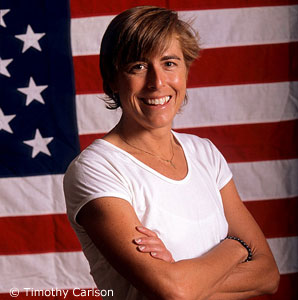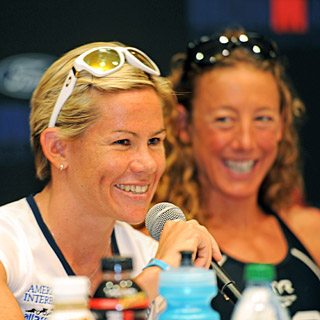Mirinda and Siri – bidding adieu
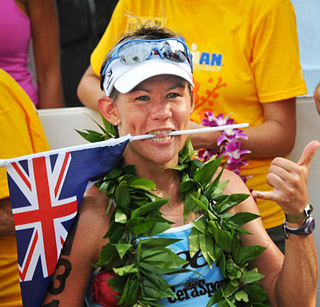
By the very nature of the sport, the triathlete-coach relationship is even with the best of results and the best chemistry almost always doomed by a myriad of circumstances to be ephemeral. And after an incredible seven-year run, so too did it happen this year with triathlete Mirinda Carfrae and coach Siri Lindley.
When Lindley, the 2001 ITU Olympic distance World Champion whose career blossomed under the tutelage of the legendary Brett Sutton, took charge of Carfrae midway through the first decade of the 21st century, good things happened. By the end of their run, Carfrae had won the 2007 Ironman 70.3 World Championship, took 2nds in 2009 and 2011 and a win at the 2010 Ironman World Championship, dominated the Ironman 70.3 circuit, and proved she still had world class speed with a 2nd place at the recent Hy-Vee triathlon.
When they began working together, Carfrae was free to spend most of her time in Lindley’s intense camps and blossomed under Siri’s positive energy and breadth of knowledge, much of which she learned from Brett Sutton. In the past few years, in the wake of her success and growing responsibilities to sponsors, fans and races, Carfrae was not free to spend as much time on the road in Lindley’s camps, and Lindley was not so free to come to Carfrae's side as as she was incresasingly busy supervising other topflight stars such as Leanda Cave, Rebekah Keat, Magali Tisseyre and Luke McKenzie as well as a promising crop of rising pros.
In the last few weeks, Lindley and Carfrae responded separately via email to questions about their time together, the reasons for the split and how they see the road ahead.
Slowtwitch: You and Siri have had 7 great years together. Why change now?
Mirinda Carfrae: Siri and I had very successful years together. We accomplished what we set out to do and I think we both just needed a change. Siri has been with me on a great journey. We’ve have learned a lot and grown as people. I was also not as keen on group sessions and camps that pulled me away from home for months at a time. It was just time to move on. I really didn’t spend much time in camp with her the past couple of years. I think I was only in camp maybe 6 or 8 weeks total in 2010 and about 3 or 4 weeks total for 2011. Being away from your coach allows you as an athlete to grow and forces you to listen to your body a lot more. You are the one really driving the boat, but it was always nice to be able to pick up the phone with Siri and talk through any issues I may run into. After knowing me for so long she was always there and able to tweak the program when I was too knackered to be able to read my body properly.
Siri Lindley: It was time. We achieved absolutely everything we set out to achieve. Ticked off all the boxes and had the most amazing time doing it! Mirinda is now confident in her ability to continue on in her career without the support of our coach/athlete relationship.
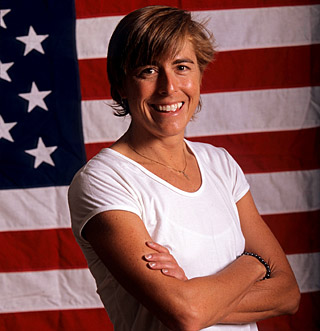
How did they handle the long distance coach-athlete relationship?
Siri: In the past few years, I coached her with all the same time and energy but it has to happen over email and phone instead of in person. I don't require athletes to be at camp, but they choose to come, knowing that when they do, it always seems to help them achieve all new levels in performance. I would travel to Boulder a few times each summer to coach Rinny individually and this worked out very well for us. But, as I had a full squad of 15 athletes, that could only happen a few weeks out of the year. So, Rinny sees the rest of the squad training with me, in person, 24/7, and that makes it hard for her to justify hiring me as the others do.
ST: Did you communicate by email/telephone/Skype?
Mirinda: We mostly just chatted on the phone. We got to a point where we didn’t really need to be physically in the same place in order to put together a good plan.
Siri: All of the above. Again, we were great at communicating and addressing any issues that came up on a daily basis.
ST: What was the bottom line on decisions when you were apart?
Siri: The most important thing was that I laid out the plan I believed in, and Mirinda signed on to it, with 100% confidence. This belief, this ALL-IN approach is what gave us the power to make it work. It was magical, truly, and something we both will appreciate and never forget.
The importance of hands on coaching in camp
ST: How much did this decision to split have to do with geography? That Siri's squad is often centered in Los Angeles and Mirinda’s residences of choice were Boulder and a yearly visit home in Australia?
Mirinda: The last few years I’ve distanced myself from the camps and it is hard for a coach to be removed from the day to day piece of reading an athlete and identifying their state, then to arrive in Kona and pick up the reins and refocus on the task at hand. I’ve grown and been able to set up a home in Boulder that I love and it’s also important for me to spend a little time in Australia with my family each year. So yes – this played into the overall decision.
Siri: In the beginning, she spent many months every year, training with me in person. Getting that 24/7 attention. Now, however, she has set herself up with more stability, having homes in Australia and Boulder with her boyfriend Tim O'Donnell and she spends much less time at training camp. This is hard for me, because I like to have my finger on the pulse as often as possible, to follow any technique changes, or to be able to see that what we are doing is exactly what we need to be doing, each and every day, to achieve optimum results.
This is an another reason why I so like to have my athletes with me, during those most important times — so we can address any problems, make some fixes with plenty of time, to put it to good use, and have all cylinders firing on race day. Leanda Cave was at camp for most of August and September leading into Kona, and I know that really contributed to her awesome race that day [a personal best third place].
ST: What strains did this put on optimum coaching?
Siri: We usually do a camp together in Santa Monica 6 weeks out of Kona. We didn't do that this year. She stayed in Boulder. When we met up two weeks before Kona, I noticed that she looked a bit different on her bike. Had I seen it a lot earlier, we would have addressed it. But being 2 weeks before the race, it was too late, in my opinion, to make any changes. That I felt hurt us a bit, and could have been avoided.
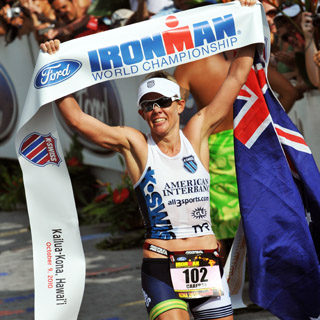
Chemistry and character
ST: I know that you liked Siri's message of positivity. Why did you two get along so well and work so well together for so long?
Mirinda: I am all business and tend to focus on just getting it done which means when I am in that stretch of training and racing I can get beat up and Siri is always there to evaluate and push the energy my way, which she has a lot of! It was a winning combination.
Siri: We had a great respect for one another. An understanding. A friendship. We know each other so well, and had an amazing communication. Obviously this grew over time. We learned to communicate. I am a huge communicator and that is at the center of all my coach/athlete relationships. It took us a while to nail it down, but once we did, that’s when we really caught our stride. Both of us are incredibly determined individuals. She came to me with some huge dreams. I took those dreams on as my own. We both set about devoting our entire lives towards making these dreams come true. That is incredibly powerful — the power of two, not just one! As you can see, it worked great, and we both will be forever proud of all we created.
Lindley’s biggest contribution
ST: What was Siri's biggest contribution to your career?
Mirinda: Siri showed me how to be a consistent athlete year in, year out. She made sure I looked after my body and never let me dig myself into too big a hole. She did this by constantly installing confidence in my abilities as an athlete.
Siri: You would have to ask her that! Hopefully, I have helped influence her in a positive way as a human being. I hope I have helped provide her with an experience that will shine bright in her memory for the rest of her life. If I have done that, I have achieved everything I would have hoped for.
Pride in their mutual record
ST: What are you most proud of in your work with Siri?
Mirinda: I am proud that we stuck together for such a long time through thick and thin! I am proud to have had the opportunity to work with such an amazing person. The two world titles were pretty good, too. .
Siri: I am so incredibly proud of US for achieving all that we did! Against all odds, we did it, and the best part about it, it was FUN!!! Achieving what most would have deemed impossible, for an inexperienced duo such as us, in 2009, was probably my proudest moment ever. No words can describe my gratitude for the fact that all our hard work, resulted in a world championship crown on that day! Unbelievable!! AMAZING!! Will never ever be able to think about it without getting goose bumps all over!!
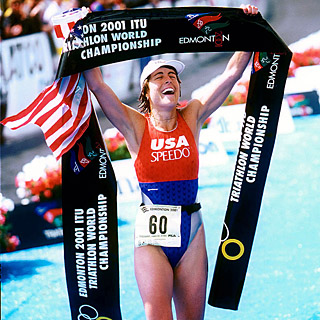
Breaking up is hard to do
ST: There is a sort of heartbreak at the inevitability of athletes moving on. Because this lasted so long and I imagine you parted on good terms, how tough was this?
Mirinda: Yah – it’s tough. It’s a break–up! But we have so much that we have shared together and learned along the way. The respect I have for her as both a friend and coach is very high. She now has an amazing squad of talented athletes and I know she will be looking to develop World Class talent and I am glad she has more time to focus on the growth of her team.
Siri: This was the hardest split of all. Seven years is a long time. We have an incredible history that includes, and I feel confident Mirinda would say the same, our most memorable, and greatest moments of our lives thus far. Again, when an athlete comes to me, their dreams become my dreams. Mirinda and I achieved our dreams of becoming 70.3 World Champion, and Ironman World Champion. Those moments can never be replaced. Those memories are engraved in my mind and on my heart. So, having shared this, and knowing the work that we put into it — the time, the energy, the great times, the tough times, the lessons we learned, the laughs we had, the battles we had, the incredible learning curve we followed. It was an incredibly profound journey. So, saying goodbye after all of that, is incredibly difficult. Above all, we have the utmost respect for one another, and I, of course, wish her the best.
Unique partners
ST: What is the most remarkable thing about Mirinda Carfrae – what makes her unique?
Siri: She is incredibly determined and has an awesome work ethic. She will never, ever, ever give up. Her belief in herself and the work that she is doing fuels her to always bringing out her best on race day. Her passion runs deep and fuels her every day!!
ST: What is the most remarkable thing about Siri? What makes her unique?
Mirinda: Siri is an extremely passionate person, that is what I love so much about her. She loves her athletes like they were her own family and will do whatever it takes to make their dreams come true. But the most remarkable thing about her is her energy – it really is something that has to be seen to be believed. There was not a session that I turned up too that she wasn’t practically bouncing off the walls with excitement.
New coach or self coached?
Siri: You will have to ask her that. My door is always open for her should she change her mind
Mirinda: I am writing my own program leading into Melbourne which will give me some time to evaluate my situation.
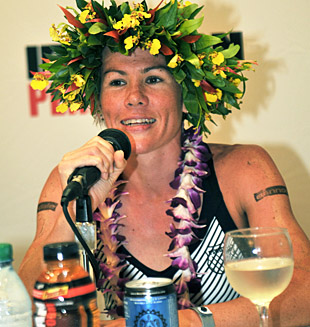
How Lindley evolved into a long distance triathlon coach?
ST: What was Siri's approach to preparing you for Ironman 70.3 and Ironman races?
Mirinda: Being consistent and doing high intensity quality training, but making sure we took the rest when I needed it. The plan has worked beautifully, I never really hit any areas of overtraining and have stayed healthy. This is a big part of my approach. I love to race and want to be race ready at every start line.
ST: Some might have thought that your Olympic distance racing experience was best fit for Olympic distance athletes and that training for an Ironman might have been a little over your head. Obviously that proved untrue. How did you learn enough to guide Mirinda to the long distance heights?
Siri: When I raced I had the greatest coach on the planet, Brett Sutton. He taught me so much. He has been my greatest mentor, and has always been so encouraging in my journey as a coach. He has always believed in me more than I believe in myself. We have varying opinions on so many things, but he has taught me the most powerful principles to follow.
ST: What are some of those principles?
Siri: I am all about following my gut…figuring out what seems to make sense as far as racing a certain distance or attacking a certain goal. With his coaching, I came to believe in my inner strength, in my knowledge and in my heart…and I coach from that place. I am so incredibly grateful for all that has taught me, and all the things I learned through our time together, and still.
ST: Anything else?
Siri: Other powerful guides for me have been my inspirations in the sport….. I won't list them all as I would hate to leave anyone out, but friends in the sport, like Mark Allen, who without even knowing it has been an incredible role model for me.
I also learned a lot through observation. Traveling to these races before I had athletes doing them, asking questions, making my own realizations, coming up with a heartfelt plan that made sense to me, and that I had enough confidence in, to give it a go.
One more thing I do a lot of is studying other sports. You can get so much knowledge about how to train an athlete for our sport by taking different principles from other sports, being creative, and putting together something that works for you! Tweaking things for continual progress and finding ways to continue to reach all new heights.
Does the message get old?
ST: Might part of it have been that Mirinda knew your message by heart and she needed new input?
Siri: My message, as far as training plans and ideas, are always changing. My message about this sport, in relation to life, and how to be the best that you can be — that stays the same. With the training, you can't just do the same thing year after year. As the sport changes, as people get faster in all three disciplines, we must change along with it. So my training practices are always evolving, but my philosophy and strong principles will always stay the same. Any good coach is constantly learning, and wants to be. We have to step up our games just like the athletes do.
ST: Might part of it have been that you were so familiar with Siri's message you simply needed new input?
Mirinda: Siri is an amazing motivator and her message is always positive and appreciative. After so many years in camp with her I can almost hear her voice in my head when I am training on my own. But I’ve also come to a point where I would like to change it up a little bit with some new stimulus.
What will Mirinda do differently?
Mirinda: There is no doubt that my program with Siri has evolved a little each year but I just felt that it was time to take a look around and see if I can tap into some other ideas. It will also give me an opportunity to utilize my current bike team which includes some of my sponsors and Retul. I have been pretty conservative on my bike training and set up in the past but am looking forward to placing more emphasis on this moving into 2012.
Siri: Mirinda is great friends with Craig Alexander, and I know she received great inspiration from him, and great encouragement that she would bring to the table.


